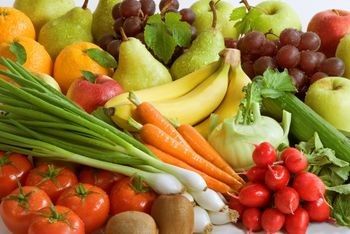Monthly Archives: October 2011
Cancer Fighting Foods
October is National Breast Cancer Awareness month and chances are if you haven’t been touched by cancer in your lifetime, you know someone who has. 1 in 8 women in the U.S. will develop breast cancer over the course of her lifetime and a woman’s risk doubles if she has a first-degree relative (mother, sister, daughter) who has been diagnosed with breast cancer. Breast cancer is the second leading cause of cancer-related death among women in the U.S. behind lung cancer.
Yes, those are sobering statistics, but we’re not here to focus on cancer or give it any more power than it already has. We’re here to get information, take control of our health, and do what is in our power to prevent getting any kind of cancer or its reoccurrence in the first place. While genetics and gender contribute to certain risk factors, we can fight back and lower our risk through diet and exercise. Obesity greatly increases our cancer risk and if you incorporate the foods mentioned in the list below, and eliminate processed foods, you may find the pounds dropping away, which will also lower your risk.
First, a few foods to eliminate (or limit):
Sugar: Studies show that diets high in processed sugar cause insulin spikes and stimulate tumors to grow and can contribute to breast cancer. A low-glycemic index diet may lower your risk by 253%. Eliminate sugary desserts, ice cream, white bread, candy, sodas, etc.
Alcohol: Studies show that drinking alcohol increases your risk of breast cancer; in fact, one drink a day increases your risk by 7 percent! One study in the Journal of Clinical Oncology found that survivors who have one or more drinks per day have a 90% increased risk of recurrence!
Now, we’ll share the “super foods” that are shown to lower our cancer risk. No single food or nutritional component can protect you against cancer by itself, but scientists believe that a combination of foods in a predominantly plant-based diet may. It’s recommended that you eat a minimum of 5 servings of fruits and vegetables per day. The American Institute for Cancer Research recommends that at least 2/3 of your plate should be filled with vegetables, fruit, whole grains and beans. All fruits and vegetables have a role in your diet, but there are some super stars singled out in the list below because of their cancer-fighting benefits.
“Super” Foods and Nutrients for Lowering Your Cancer Risk:
Beans (legumes, lentils, peas): The active ingredients in beans that scientists believe may play a role in cancer prevention include: saponins, protease inhibitors and phytic acid, which appear to protect our cells from damage that can lead to cancer.
Berries: All berries, but particularly strawberries and raspberries, are rich in ellagic acid, which has been shown to act as an antioxidant, help the body deactivate specific carcinogens and help slow the reproduction of cancer cells. Blueberries contain anthocyanosides, which scientists believe are the most potent antioxidants yet discovered. All berries are good sources of vitamin C and fiber (and half of our smoothies contain berries).
Cruciferous and Dark Green Leafy Vegetables: Studies suggest that cruciferous vegetables (such as broccoli, cauliflower, cabbage, brussel sprouts, bokchoy and kale) help regulate a complex system of bodily enzymes that defend against cancer and even have the ability to stop the growth of cancer cells. The dark green leafy vegetables like spinach, kale, romaine lettuce, collard greens and Swiss chard appear to act as antioxidants, scouring potentially dangerous “free radicals” from the body before they can do harm. (Try one of our salads – containing both romaine and field greens!)
Garlic: Garlic belongs to the family of vegetables called Allium, which also includes onions, scallions, leeks and chives. A compound in garlic called diallyl disulfiderecently proved the ability to kill leukemia cells in the laboratory. In other studies, Allium vegetables have slowed the development of cancer in several stages and at various body sites: stomach, breast, esophagus, colon and lung.
Red and purple grapes: Grapes are a rich source of resveratrol which has been shown to slow the growth of cancer cells and inhibit the formation of tumors in lymph, liver, stomach and breast cells. Resveratrol has also triggered the death of leukemic and colon cancer tumors in the lab. The skin of the grape contains the most resveratrol and the red and purple grapes contain significantly more than green grapes.
Green Tea: Both black and green teas contain polyphenols and flavonoids, which are potent antioxidants. (Did you know we now offer black and green hot tea at our Café?) In laboratory studies, green tea has been shown to slow or completely prevent cancer development in colon, liver, breast and prostate cells. Note: Enjoy a cup or two of green tea daily but don’t go over-board. Very high amounts of green tea have been shown to interact with drugs that affect blood clotting such as aspirin and change the way the body metabolizes certain medications. (But one Very Berry Green Tea Smoothie or Kiwi Citrus Green Tea Smoothie will do you good!)
Tomatoes: Tomatoes contain lycopene (which is chiefly the reason for their red color). Lycopene and its related compounds tend to concentrate in tissues of the prostate, giving cancer researchers substantial and convincing evidence that foods containing lycopene probably protect against prostate cancer. (Various wraps, sandwiches, and salads at TSC contain freshly cut tomatoes.)
Fish: It’s known that Omega-3 fatty acids help reduce the risk of heart disease and new studies show it may even be beneficial in slowing the onset of Alzheimer’s disease, but fish may also be a cancer risk-reducing food. Lab studies show that the omega-3s from fish oil get in the way of cancer development. Population studies seem to suggest that a steady diet of fish results in lower risk of cancer. Recent research suggests that maintaining a balance between omega-3 and omega-6 fatty acids is protective of breast tissue and overall health.
Vitamin D: This is a fat-soluble vitamin that helps absorb calcium. Known for building strong teeth and bones, it may also help protect against cancer. A report presented at the latest meeting of the American Association for Cancer Research (AACR) showed a link between increased vitamin D intake and reduced breast cancer risk by up to 50 percent. Get vitamin D in milk, cod, shrimp and Chinook salmon. Eggs (found in our breakfast wraps) are another good source.
Walnuts: Studies show that just a handful a day reduces your risk. Walnuts have phytosterols (cholesterol-like molecules found in plants) that have been shown to block estrogen receptors in breast cancer cells, possibly slowing the cells’ growth.
Flaxseed: Flaxseed may reduce your risk of breast cancer by 54%, according to recent studies! (Our Triple Berry Oat Smoothie is hearty enough for a meal, and contains oats and flax.)
Everyday choices impact our cancer risk. We have the ability to reduce our risk simply by what we decide to eat or not eat. As we wage war on cancer, we’re finding that our diet could be the most promising ammunition to date. We hope you’ll make Tropical Smoothie Café a part of your dietary choices. With our fresh food and real fruit smoothies, an anti-cancer diet can be pretty tasty!
Click here for Article Sources and for Further Reading





